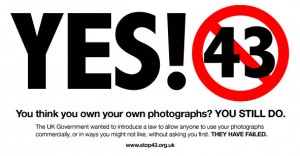Earlier this year the stop43 campaign successfully campaigned against the introduction of Clause 43 in the Digital Economy Bill, arguing that the legislation would take away the rights of photographers and artists.
Campaigners, which included members of the Association of Photographers, the British Institute of Professional Photography, the British Press Photographers’ Association, Copyright Action, EPUK, the National Union of Journalists and Pro-Imaging, were worried that proposals to collect a fee for commercial use of works whose creator could not be identified (so-called “orphan works”) were in the interest of commercial publishers rather than the original producer.
They got their way, and Clause 43 was removed from the Bill, before it became an Act.
 While Clause 43 may be dead, Stop43 isn’t and it has been developing a ‘New Thinking’ proposal, to take to the new coalition government.
While Clause 43 may be dead, Stop43 isn’t and it has been developing a ‘New Thinking’ proposal, to take to the new coalition government.
Stop43 supporter and photographic consultant Pete Jenkins told Journalism.co.uk that parliament will again be looking at orphan works and copyright, after the summer. “[W]e need to ensure that they are working on the right models – that is models that are creator friendly rather than publisher friendly as witnessed in the past,” he said.
The campaign has now unveiled its new proposal, which lays out plans for “cultural use” of orphan works, “and for this cultural use to switch all other uses and users to “known” works, to stimulate cultural and economic activity to the benefit of everyone”.
To enable this we propose some changes to current copyright law and the establishment of a National Cultural Archive, which must be free to use.
The group will continue its efforts to replace “inequitable and unworkable proposals” in the failed Clause 43, says Paul Ellis, co-founder of Stop43, in the latest announcement. The New Thinking proposal, he believes, “should benefit everyone”.
The Conservatives promised in their manifesto to introduce an Intellectual Property Act and we would like our proposal to be incorporated into that Act.
Although our proposal concerns itself with photography we believe it could easily be extended to all media types to create a massive cultural and economic resource of immense value, and Stop43 is eager to work with creators active in other media to achieve this.
This proposal was first introduced at the 2nd National Photography Symposium at the beginning of May, and was received well, with almost unanimous support, says the group.
The proposal has three parts [PDF at this link]
- The arguments against Clause 43’s proposals.
- The National Cultural Archive
- Background information: the characteristics of digital media and networking, how digital intellectual property is used, and the different photography markets
Jenkins is optimistic that the new Conservative-Liberal Democrat government will listen. “[P]ersonally I am hopeful that we (photographers) will get a better response from the new government than we did with the old regime,” he said.
But there are challenges, Jenkins warns, citing the British Library’s recently announced partnership with DC Thompson’s brightsolid, as an example. Plans to digitise newspapers and make the British Newspaper archive available to the public for a fee, trouble him.
Whilst their initial efforts involve out of copyright material, if all goes to plan it will not be long before the partnership is digitising work which is in copyright. Although questions have been asked of the British Library as to the clearance of copyright they have refused to answer any of them.